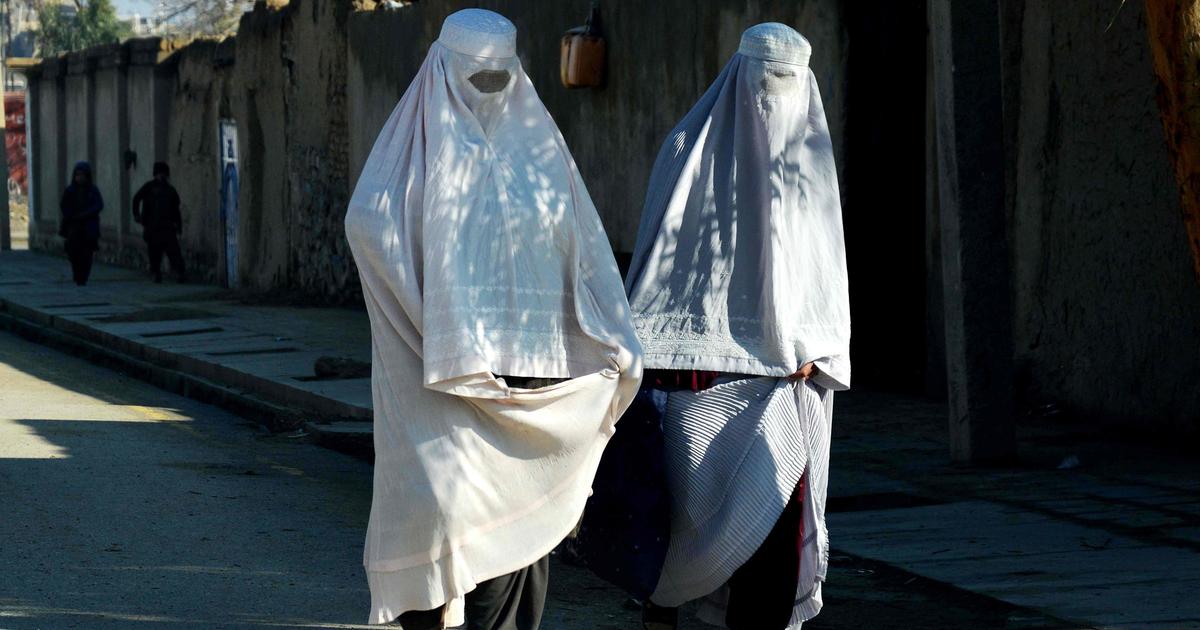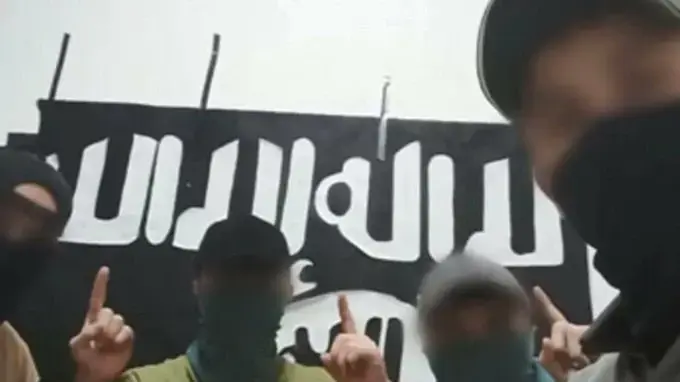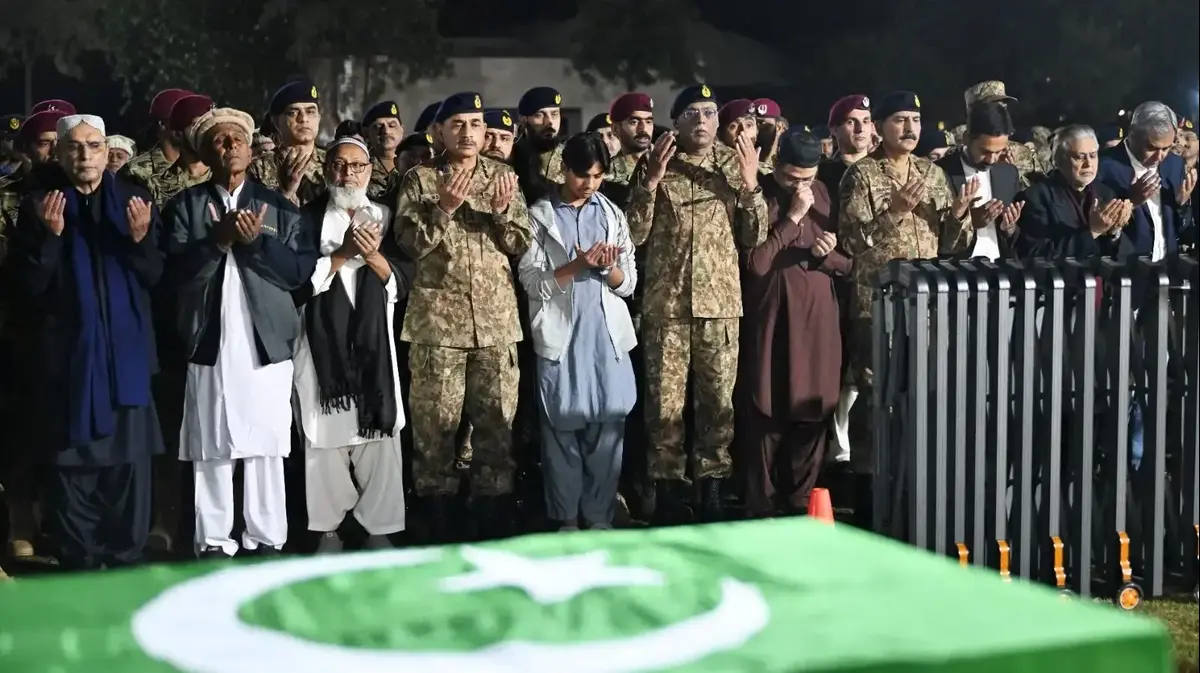One year of Taliban rule in Afghanistan: "My theory is that there will be a civil war"
Created: 08/15/2022, 17:51
By: Anna-Katharina Ahnefeld
August 15, 2021 changed the lives of people in Afghanistan.
An Afghan man rides a bicycle while young Taliban fighters in the back of a pickup truck patrol the streets of Kabul.
© Oliver Weiken/dpa
International troops withdrew from Afghanistan in August 2021.
Journalist Waslat Hasrat-Nazimi fears a further escalation.
Bonn – The images of the desperate people at Kabul Airport after the hasty withdrawal of international troops burned into the eyes of the world public.
The Taliban took power in Afghanistan on August 15, 2022, one year ago.
Twelve months later, little remains of the sympathy of the time, also because the crises are piling up on the West's own doorstep: the Russian war of invasion in Ukraine, the energy crisis, the power struggle with China.
FR.de
from IPPEN.MEDIA talks to the German-Afghan journalist and author Waslat Hasrat-Nazimi
about women's rights, the influence of China and Russia in Afghanistan and how the Taliban will continue.
Her book "The Lionesses of Afghanistan: The Long Struggle for Self-Determination" will be published by Rowohlt-Verlag on August 16, 2022.
In the first few weeks, international attention and sympathy for Afghanistan was great.
I knew, of course, that this would ebb away, but that it happened so quickly... it affected me a lot.
Waslat Hasrat Nazimi
On August 15, 2021, the Taliban again took power in Afghanistan.
How did you experience that day and the time that followed?
To be honest, I still haven't gotten over those days.
This was a shocking, traumatizing time for everyone involved with or in Afghanistan.
Of course, the Taliban takeover did not come as a complete surprise.
I have always said to my colleagues that the Taliban will soon be back in power.
Several provinces were already falling weeks before August 15, so we knew the situation would continue to get worse.
Fortunately, even then we started to get our people and their families out.
The evacuations were what we held on to during those days and weeks that gave us hope and purpose.
At the same time, in doing so, we pushed aside the situation itself in Afghanistan.
Our evacuations are still not complete.
That's why I haven't really looked into what actually happened until today.
Even if I mourn - for the hopes we had for the country.
In your book you wrote that your mother was visiting Kabul until shortly before the Taliban took power.
When she was in Kabul, I called her regularly and said: Please come back.
But she was convinced that she would be safe in Kabul.
From my own experience, I know how quickly you lose sight of what's happening in the provinces when you're in this bubble.
You felt unassailable there.
In the end it was my little daughter who made her return earlier crying and saying grandma come back now.
That was just before August 15th.
We were lucky, I know of many who got stuck in the country.
You couldn't have imagined that until shortly before the takeover of power.
My mother also thought she could always get out if the Taliban were in front of Kabul.
But no, it wasn't like that.
A year has passed since then, and the Taliban rule Afghanistan.
What has changed?
How are the people in the country?
The economic situation is very bad, even worse than was thought in the first few weeks after August 15th.
Most people live below the poverty line.
The first efforts are now being made to bring money back into the country and to at least partially lift sanctions.
You can't let the people starve there, because it's always the population that suffers the most from sanctions.
And then, of course, the fact that girls from the sixth grade on are still not allowed to go to school.
This is a reason for many families to turn against the Taliban, even those who initially thought that at least the Americans were gone and that there would be calm.
Most of them therefore want to leave the country.
I don't know anyone personally who would like to stay.
also read
Ex-intelligence chief: Vladimir Putin will experience an 'unpleasant end'
Journalist loyal to Putin calls for atomic bombs on London and Washington - "And that's it then"
At the same time, in your book The Lionesses of Afghanistan, you describe that there are people who welcomed the Taliban takeover.
Can you explain that?
For years there was no security for the people in the contested areas in the south and south-east of Afghanistan.
They didn't know if they would be killed in combat or by drones if they went out.
This wasn't life.
In these areas, the Taliban takeover was initially welcomed because the fighting had stopped.
And then, of course, there were human rights violations by the United States and the Allies, such as Australia.
These alleged war crimes by the soldiers did not go unnoticed by the population - and they were against the deployment of international troops.
I would be lying if I said that I didn't initially think that at least there was no more war.
But that was not the case.
There are still attacks.
The Taliban continue to persecute people
Journalist Waslat Hasrat-Nazimi talks to FR.de from IPPEN.MEDIA about the year after the Taliban took power.
© Julia Sellmann
To person
Waslat Hasrat-Nazimi, born in 1988, is a German-Afghan journalist and presenter, and heads the Afghanistan department of Deutsche Welle.
As a child she fled with her family from Afghanistan to Germany, where she grew up.
Her first book, The Lionesses of Afghanistan: The Long Struggle for Self-Determination (Rowohlt), will be published on August 16, 2022. It is a feminist perspective on the women of Afghanistan and their struggle for self-determination.
"The West hasn't even asked itself what women in Afghanistan really want"
What about women's rights in Afghanistan - will they ever be upheld under the Taliban?
no
Women's rights in Afghanistan have always been used, by the West to legitimize this war - and by the Taliban, who are now saying, let's show you what we think of your women's rights.
They use women and women's rights to get back at the West.
I don't think that will change anything in the near future.
There was probably a window of opportunity early on to influence the Taliban.
But this was simply not used.
There wasn't enough interest in putting more pressure on the Taliban.
In your book you criticize white feminism.
Can you explain that in more detail?
The second wave of feminism was all about sexual self-determination and about women being able to go to work and keep the money for themselves.
However, these issues did not really apply to Afghanistan.
After the first Taliban rule in Afghanistan, it was not about gaining sexual self-determination.
The West hasn't even asked itself what women in Afghanistan really want.
Instead, they spoke for them.
Of course, years of war were not what Afghan women wanted.
A war that only brings more violence with it, because mostly women are the victims.
Instead, the western countries wrote on the flag that women are now allowed out of the house or no longer have to wear the burqa.
The typical White Savior mechanism.
So, despite all the decades on the ground in Afghanistan, the West never really understood or wanted to understand the country?
They didn't understand Afghanistan or didn't want to understand it.
Instead, they said to themselves that the people of Afghanistan were so different, had a different way of thinking, that you couldn't understand them anyway.
It wasn't even tried!
That was very short-sighted.
At the end of the day, they are people who want exactly the same thing as people here.
Security, a self-determined life and that the children can go to school.
In the beginning, the Taliban were interested in gaining international recognition and being recognized as a state.
Not anymore.
They have turned away and are now focusing on China and Russia as new partners.
Waslat Hasrat Nazimi
China and Russia in Afghanistan: "The West is gone and we're taking over the field again"
Do the Taliban still want international recognition?
In the beginning they were interested in gaining international recognition and being recognized as a state.
Not anymore.
They have turned away and are now focusing on China and Russia as new partners.
Are China and Russia concerned with economic policy interests?
Afghanistan has several trillions of valuable mineral resources.
The geostrategic location is equally important.
The country lies exactly between Iran and Pakistan, China has a small border with Afghanistan.
It is precisely this section that China and Pakistan need for their major project to open up transport routes in Central Asia.
That's why they want power and leeway in Afghanistan.
At the same time, of course, it's also a symbolic act. The West is gone and we're taking over the field here again.
Since the beginning of the year, the eyes of the world have turned from Kabul to the Russia-Ukraine war.
How does that feel?
It hurts.
In the first few weeks, international attention and sympathy for Afghanistan was great.
I knew, of course, that this would ebb away, but that it happened so quickly... it affected me a lot.
What about Afghanistan's neighboring countries, how are they coming to terms with the Taliban?
The West has always fought its wars in Afghanistan.
This is still happening now, as we can see from the drone attack on al Qaeda boss Aiman al-Zawahiri.
The conflict is not over.
The fact that the United States still has these opportunities is a negative sign for Afghanistan's neighboring countries, because they believed they were safe after the withdrawal.
It can be assumed that the situation in Afghanistan will continue to deteriorate.
That the conflict is far from over.
There are more attacks in Afghanistan now, whether by the so-called Islamic State or by resistance groups.
If neighboring countries feel threatened enough by the Taliban, then they are likely to fund these groups.
So far this has not been the case because they wanted to come to terms with the Taliban.
About IPPEN.MEDIA
The IPPEN.MEDIA network is one of the largest online publishers in Germany.
At the locations in Berlin, Hamburg/Bremen, Munich, Frankfurt, Cologne, Stuttgart and Vienna, journalists from our central editorial office research and publish for more than 50 news offers.
These include brands such as Merkur.de, FR.de and BuzzFeed Germany.
Our news, interviews, analyzes and comments reach more than 5 million people in Germany every day.
Taliban rule in Afghanistan: "My theory is that there will be a civil war"
Do you think the Taliban can maintain their rule in Afghanistan in the long term?
And what could come after them?
My theory is that there will be a civil war because the Taliban are at odds with each other.
There are many differences within the Taliban, which are made up of different groups.
You can see that, for example, with the subject of school access for girls, where there are different views.
I don't think the current unit will last.
In the long run, they will end up fighting each other.
This is reminiscent of the situation in the 1990s when they were already in power.
I also think that the groups that are against the Taliban, like the so-called Islamic State, but also resistance groups, are getting stronger.
Also because the neighboring countries have an interest in the Taliban not staying in Afghanistan in the long term.
In addition, the Taliban are unable
to keep the population happy, be it economically because there are no jobs or because people are starving.
They won't last forever
How can the international community find a way of dealing with the Taliban government - especially with regard to the economy and sanctions?
That's very difficult.
Efforts are being made to pay out aid directly to the population in order to bypass the Taliban.
But the Taliban are corrupt and try to get the money, for example by paying them something so that they pass on the money.
That is why it has been very difficult in recent months to implement the disbursement of the aid funds in such a way that the population receives them.
Nevertheless, you have to try, you can't let people die just because you don't want to negotiate with the Taliban.
There was corruption in the previous government, too, and that's how it was done.
That doesn't mean I'm in favor of it, but I just think human lives are more important.
International correspondent Natalie Amiri traveled to Afghanistan in late 2021. In her "Afghan Diary" she reported on her experiences - more than 100 days after the Taliban took power.





/cloudfront-eu-central-1.images.arcpublishing.com/prisa/KA3LQ5ZEAFEQXOIZXJEEVDUZUQ.jpg)







/cloudfront-eu-central-1.images.arcpublishing.com/prisa/KMEYMJKESBAZBE4MRBAM4TGHIQ.jpg)

